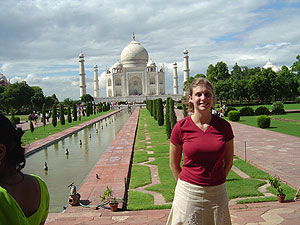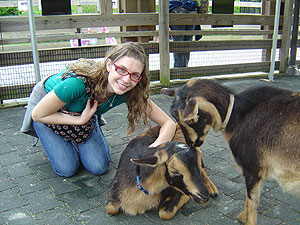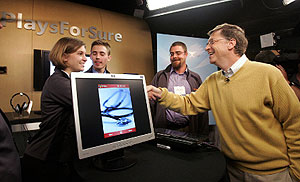REDMOND, Wash. — June 30, 2010 — It was the summer of 2006. Joanne Cunningham had just represented the United States at the Imagine Cup World Finals in India, and finished her master’s degree at Virginia Commonwealth University. She had been accepted into the school’s doctorate program and was setting her sights on earning a Ph.D. in computer science.

In 2006, Joanne Cunningham competed at the Imagine Cup World Finals in India, where she visited the Taj Mahal.
Then her plans changed.
Cunningham got a call from a Microsoft recruiter asking if she could come to Redmond for an interview. She flew across the country and was soon offered a job. All of a sudden Cunningham became a software development engineer in test (SDET) with the Microsoft Office Assistance Platform team.
“I figured I could always get a Ph.D. further down the road, but this opportunity probably wasn’t going to come up again,” says Cunningham, now an SDET for the Windows Phone 7 Search and Maps team.
At the time, she didn’t wonder too much about getting the recruiter’s call out of the blue. “Well, I had never applied to Microsoft,” she says with a laugh. “So I think the Imagine Cup had something to do with it.”
Cunningham and three other graduate students from Virginia Commonwealth University had flown to New Delhi and Agra, India, where they faced off against many of the world’s top students in the Microsoft-sponsored technology competition. Her team finished in the top 12 in the competition’s high-profile software design category.
Cunningham says her experience at the Imagine Cup helped prepare her to transition from the classroom to the real world of work.

Cunningham visits the National Zoo after serving as a judge at the 2010 U.S. Imagine Cup Finals in Washington D.C.
“I think the Imagine Cup gave me the opportunity to do something I hadn’t done before, and that was to see software through the whole lifecycle,” she says. “I think that made me a more well-rounded software engineer. Would I have gotten to the same place without the Imagine Cup? Maybe. But the experience really gave me that lift when I was younger.”
In 2006, the Imagine Cup theme was “imagine a world where technology enables us to live healthier lives.” Cunningham’s team responded with PocketDoc, a software project that enables doctors to put reminders, survey questions, instructions, and other information on patients’ mobile devices. For example, the system can alert patients when it’s time to take medicine. After the Imagine Cup, the students gave PocketDoc to Virginia Commonwealth University, which is in the process of getting a patent for the technology.
This past spring, Cunningham returned to the Imagine Cup as a judge in the U.S. Finals. She said it was inspiring to witness the students’ passion for solving some of the world’s toughest challenges.
“We have world leaders who are working on these huge problems, and here we have college students who broke down the problem, got an understanding of what component they wanted to solve, and they solved it,” she says. “That was really cool.”
Cunningham is passionate when it comes to lending a hand. That passion almost cost her a chance to meet someone she greatly admires. She and her teammates were busy preparing for the Imagine Cup World Finals when the call came: Could they come to Redmond and meet with Bill Gates?

Cunningham shakes hands with Bill Gates before demonstrating her team’s PocketDoc system, the wining project at the 2006 U.S. Imagine Cup Finals.
At the time, the Gulf Coast was still recovering from Hurricane Katrina. Cunningham had planned on building houses in Mississippi before Microsoft asked the team to demonstrate its project for Gates. The invitation prompted her to postpone the trip to Mississippi.
“It was Bill Gates or build houses,” Cunningham says. “I’d probably never get to meet Bill Gates again.”
She and the rest of team PocketDoc met with Gates, although she doesn’t remember much about it. (“I was too excited to meet Bill G. He probably gave us some feedback.”) She did make it to Mississippi later and helped rebuild houses. And during the Imagine Cup World Finals in India, she got a chance to do some rehabilitation on an ancient temple during a community service activity organized for the students.
Cunningham said a Ph.D. is still a possibility down the road. But she’s grateful that the Imagine Cup helped her take her skills out of the classroom and into the real world for now. She encouraged the students who are about to head to Poland for the 2010 Imagine Cup World Finals to enjoy the experience and relax. View it less as a competition, she says, and more of a first step on their career.
“It’s not so much about winning as much as having a good experience, meeting people in the industry, and learning how to build good software,” Cunningham says. “The best thing about the Imagine Cup was that we got to see a software project through from beginning to end. That’s just not something you get to do in college.”




